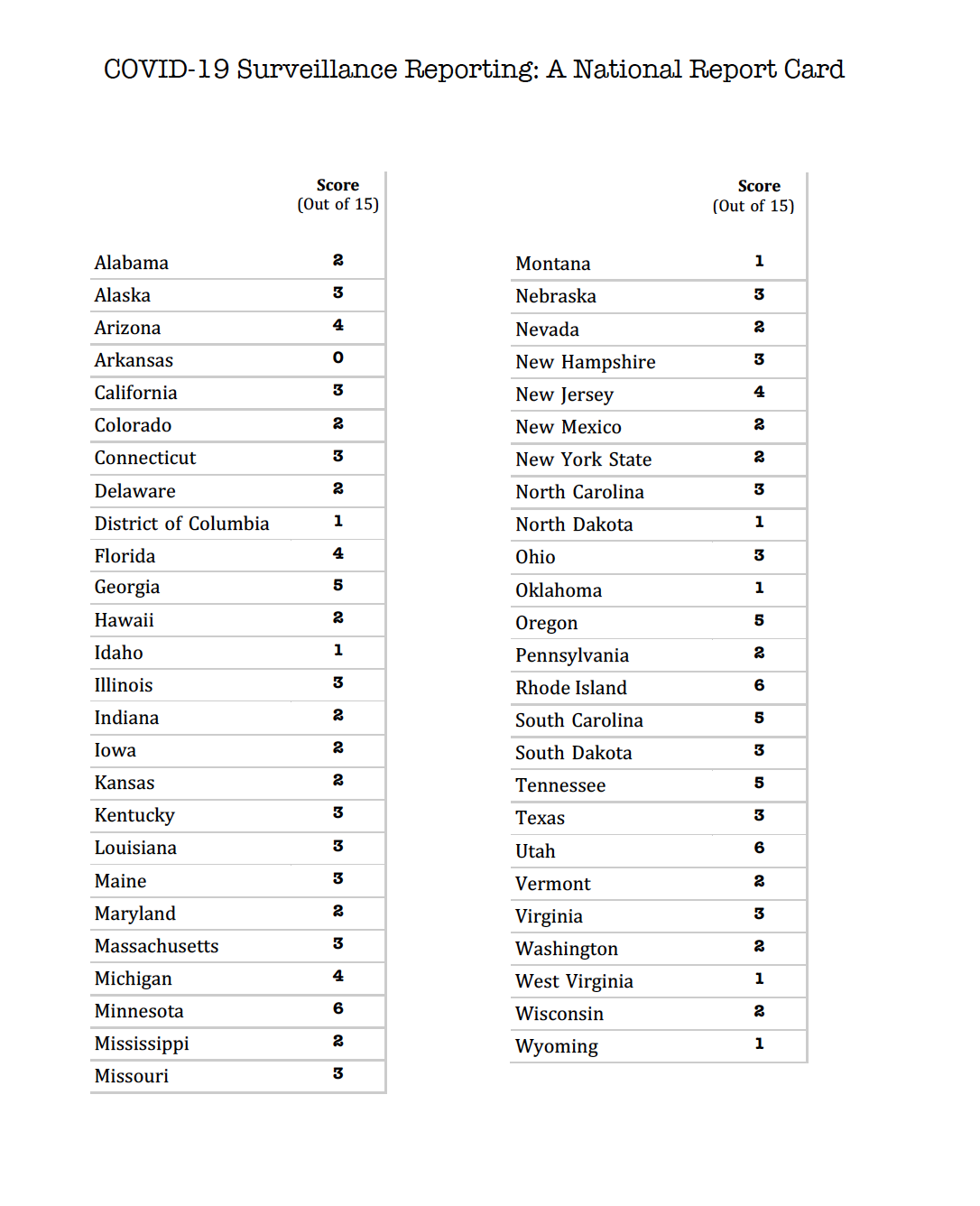US State COVID-19 Report Card
Note that our Report Card project is not currently active.
In early July 2020, the GenderSci Lab published the US State COVID-19 Report Card on the Health Affairs Blog. The Report Card is an analysis of the status of COVID-19 surveillance reporting in US states and is one piece of the GenderSci Lab’s broader COVID Project.
This page hosts the most recent updates to the Report Card. Methodology is briefly described below, but see more detail for why and how we created the Report Card in the Health Affairs Blog and in an accompanying piece on the GenderSci Lab Blog. The blog also hosts the original June 2020 Report Card and Map and all subsequent report cards.
**In April 2021, with vaccinations as an emerging variable of interest, we transitioned the report card to a new set of evaluation criteria, in order to track the variables most relevant to intersectional gender/sex analyses. This page provides the grades and visuals from this latest report card rubric. We introduce this new report card rubric here.
The National Report Card (see Report Card below) lists the grades assigned to each state based on the status of their COVID-19 surveillance reporting. The Map of State Grades (see Map below) shows the geographical distribution of grades at a glance. The US State COVID-19 Report Card Scoring Table (below) details what variables each state reports about COVID-19 cases and deaths. When active, the Report Card was updated roughly bimonthly. Prior months’ data is available in the Scoring Table.
Report Card for April 2021
See our Blog for highlights of the data shifts between February 2021 and April 2021
Update Schedule
The report card has been updated on a bimonthly basis. It is currently on hiatus due to research staff shortages.
methodology for report cards from april 2021 onwards
The new Report Cards track reporting practices at the state level for fatalities, hospitalizations, and vaccinations (we no longer track reporting practices for cases). For each of these three outcomes, five variables are tracked: gender/sex, non-binary, gender/sex and comorbidity interactions, gender/sex and race/ethnicity interactions, andgender/sex and age interactions. Thus, a state can score a total of 15 points. For a state to be reporting non-binary data for each COVID-19 outcome, gender/sex reporting must include data for trans or nonbinary gender/sex identities explicitly, or data labelled as “Other” (as opposed to being labelled “unknown”). Additionally, data must have been updated/dated within 30 days of the date of collection to be counted as present in our Report Card. Similar to our previous Report Card, a 1 indicates the presence of a variable, and a 0 indicates that the relevant variables could not be identified.
Methodology for report cards between june 2020-february 2021
The Report Card is based on a 0-10 scoring scheme for state surveillance reporting. For case reporting, a state could earn one point for each category of age, sex/gender, race/ethnicity, and comorbidities reported. Any reporting on the interactions of these first four variables also earned a point. Similarly, a state earned a point for each of these variables in their reporting of deaths, plus a point for reporting any interactions. We assigned letter grades based on total scores: F for a score of 5 or below, D for a score of 6, C for a score of 7, B for a score of 8, and A for a score of 9 or 10. See our Health Affairs Blog and in an accompanying piece on the GenderSci Lab Blog for more information.
Note: April and May 2020 reports are not specifically dated to the last Friday of the month. June 2020 and following months are accurate as of the last Friday of the month.
Contact
For media and other inquiries concerning the Data Report Card, the GenderSci Lab COVID Project or to collaborate, contact us at genderscilab@gmail.com.
The GenderSci Lab COVID Project
The Report Card is one piece of the GenderSci Lab’s broader COVID Project. Through this project, the GenderSci Lab aims to contribute to a broad-based effort to elevate the consideration of social variables in COVID-19 outcomes, improve theoretical frameworks and data quality for evaluating gender/sex hypotheses, and identify meaningful interventions to address gender/sex disparities.
For more about how US states vary in COVID cases and deaths, see our US Gender/Sex COVID-19 Data Tracker Page and our accompanying Data Highlights.
We have also written a Communication Guide for journalists and researchers working on gender/sex disparities in COVID-19.
Statement of Intellectual Labor
Boulicault, Bruch, Danielsen, Tarrant, Jillson, and D’Souza contributed to data validation and analysis.


